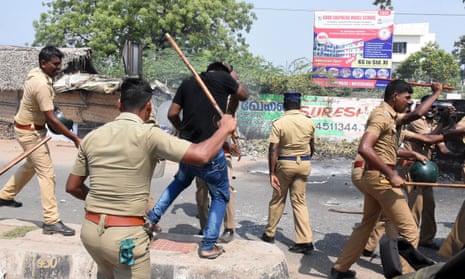Another person has been shot dead during violent protests in south India against a copper plant operated by a British mining giant residents say is polluting the local environment.
Opposition politicians in the state of Tamil Nadu have accused the police of committing mass murder against protesters opposed to the expansion of a copper smelting facility in the port city of Thoothukudi.
Ten people were shot dead and about 80 wounded by police after crowds set fire to cars and pelted officers with stones on Tuesday. Another man, identified by Indian media as a 23-year-old named Kaliappan, was killed in further protests on Wednesday.
The Madras high court ordered a halt to the expansion of the 400,000-tonne facility in response to the unrest, and ordered authorities to hold public hearings before granting environmental approval to the construction.
The smelter, operated by an Indian subsidiary of London-based Vedanta Resources, has been repeatedly shut down over pollution complaints and was fined £10m in 2013 for breaching environmental norms and operating without the consent of the state pollution board.
The same year, activists allege a gas leak from the plant left hundreds with breathing difficulties, nausea and throat infections.
Residents and environmentalists have been protesting for the past three months against plans to double the capacity of the copper plant that they say is contaminating the air and fisheries around the site.
Sterlite Copper, the Indian subsidiary that owns the plant, says the facility operates “within all the specified parameters” and blamed the unrest on “nefarious elements”.
Outrage over the police killings grew on Wednesday, and was fuelled by a video showing a plainclothes police officer boarding a bus and firing his rifle at protesters. A voice could be heard in the background saying: “At least one should die.”
MK Stalin, leader of the main Tamil Nadu opposition party, the DMK, said police were guilty of atrocities.
“Mass murder of innocent people,” he tweeted on Wednesday. “Who ordered the police firing on protesters? Why were automatic weapons used to disperse the crowd and under what law is this permitted?”
Rahul Gandhi, the national leader of the opposition Congress party, has called the deaths “a brutal example of state-sponsored terrorism”. “These citizens were murdered for protesting against injustice,” he said.
P Mahendran, superintendent of Thoothukudi district police, said 18 officers were also wounded in the clashes. “The situation is tense but under control today,” he said. “The postmortem on the bodies is being conducted and they will be handed over to families today.”
The plant, about 375 miles (600km) south of Tamil Nadu’s state capital Chennai, is currently shut as the company awaits a licence to expand the site.
The protesters had set ablaze the local administrator’s office after they were denied permission to hold a rally at the plant.
Police said efforts to disperse the crowd of several thousand with a baton charge and teargas volleys failed before authorities used live ammunition.
Tamil Nadu chief minister, Edappadi K Palaniswami, ordered the judicial inquiry into the shootings but defended the police.
“The police had to take action under unavoidable circumstances to protect public life and property as the protesters resorted to repeated violence,” he said.
The families of each victim would be offered 1 million rupees (£11,000) compensation, he added.
A spokeswoman for Vedanta Resources said it had witnessed the deaths at the protest “with great sorrow and regret”. “The company is working with the relevant authorities to ensure the safety of our employees, facilities and the surrounding community,” she said.
Tamil Nadu is one of India’s most prosperous and industrialised states but, as elsewhere in the country, environmental regulations are routinely breached and poorly policed.
Thoothukudi was also the site of violent protests in 2012 over a nuclear power plant in neighbouring Kudankulam district that left one person dead.
Mobile internet services were cut in the district and surrounding areas and early on Thursday morning the state’s pollution control board ordered the closure of the copper plant, cutting off its electricity supply.
The board claimed it had found evidence the plant was “carrying out activities to resume production” despite being ordered to wait until its license to operate was renewed.
Agence France-Press contributed to this report
